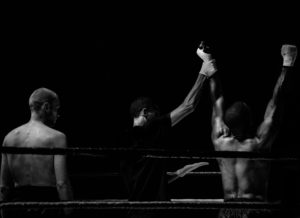
Six months ago, I was so excited to accept a contract at one of the nation’s best companies to work for. It felt beyond my reach, like the kind of thing that only happened to smarter people I knew in college, never me.
I’m now halfway through my contract, and I haven’t hit any of my milestones. What once started as the pinnacle of my professional success is now the most drawn-out, terminal diagnosis of Impostor Syndrome. And it feels incredibly defeating.
I let my guard down too soon, almost as if accepting that offer was the equivalent of a goalie celebrating a premature victory as a game-winning point is about to be scored under her nose. I can’t help but feel I’ve squandered someone else’s dream opportunity, a once-in-a-lifetime chance to really prove themselves.
There’s no pretty way to say it: I have a great job, but I’m not doing well in it.
In general, I hate being bad…at anything. My likes and dislikes are entirely dictated by where my natural skillsets lie. For example, I enjoy writing, dancing, and public speaking. I despise doing math, using technology, and talking about cars.
Sometimes, I don’t think I continue writing because I enjoy it. I only enjoy it because I’m better at it than other things. It’s actually my favorite thing to do because of all my relative strengths, it’s my best one.
On the flip side, I once agreed to try CrossFit with my boyfriend. After an hour of sloppily throwing up weights that were too heavy for me and grinding through circuits of box jumps and sit-ups, I waited until we were securely inside his car to unleash a faceful of hot tears.
“Don’t ever ask me to do that again,” I told him, sobbing into his t-shirt. That was the first and last time I will ever do CrossFit.
The experience was my personal nightmare: Not only was I bad at something, I had to be publicly bad at it.
When I find myself in a situation where I don’t thrive, my instinct is to emotionally detach. It’s a defense mechanism to protect myself from the feeling of defeat. If I can convince myself that my priorities are far removed from what I’ve failed at, then I can believe the failure was a reflection of misplaced effort instead of me as a person or my true ambitions in life.
Lately, I’ve been telling myself: My job is not my life-long career or a source of fulfillment. It is a contracted responsibility, a legal obligation where I clock 40 hours a week to secure financial stability. Nothing more, nothing less.
My life would be a lot easier if I actually believed that.
The unfortunate reality is: I take my job very personally.
A job is not just a job to me—it’s a test of my ability to succeed and be good at something. I don’t mean to sound ambitious or overzealous about what a profession means to me, especially because that’s misleading; I’ve realized a pristine and proper career isn’t a life priority of mine (if that wasn’t clear from the raunchy and incriminating blog posts I promote on literally every one of my social media accounts).
It is just in my nature to try very hard at something—anything—that could reveal my weakness or inability. Heck, I take a game of Tetris as seriously as I do my job. It’s not that I have any real stakes in manipulating colorful shapes to fit together nicely. I just fucking hate losing and being bad at stuff. If I could actualize failure into a living, breathing person, I would jump that sucker in a dark alley and punch it until my knuckles were raw bone.

So why am I sharing my violent fantasies toward failure on this balmy Tuesday?
Beyond offering you some bathroom reading at the office, I think it’s important to share the times we feel at rock bottom, especially when people from the outside may mistakenly believe we are one of the lucky ones who “has it together.” Real life is not my edited resume or my LinkedIn bio or my shiny corporate job title.
The biggest disservice we can do to the younger generation is to be glamorous about such a gritty part of our adult selves: our careers. It’s wrong to pretend that we didn’t also question our direction in life at one time or another, to feign self-assurance as we bounced around the job market, and to reduce the complex strains of professional and personal gratification to humble-brag photos of our swanky downtown office.
That is smellier BS than the “What’s your greatest weakness?” question.
As taxing as our professional development may be, it’s worth noting that feeling defeated doesn’t necessarily mean you are defeated. In a classic story arc, the protagonist will always experience the crisis before reaching the climax, the turning point of their journey.
Our darkest times probably the best predictors of approaching dawn. It’s the only change we can notice from the adapted blackness of rock bottom. *cues My Chemical Romance*
As uncomfortable as it is to feel defeated, it is actually the best possible environment for growth.
Defeat necessitates that we acknowledge our starting point, which can feel like ground zero all over again. Defeat requires us to endure these moments of paralyzing stagnancy before we rise to action. Before we choose change. Before we overcome.

I’ve talked to a few coworkers in the same [seemingly sinking] boat, and contrary to our natural reactions, I’ve decided there’s no ROI in worrying.
One of two things will happen at the end of my contract:
- I will have improved, and will continue to work at this company, or
- I will not have improved, and will work elsewhere.
Not so bad, right? I’m sure worse things have happened to far better people.
With those outcomes in mind, I have a few actionable items in front of me:
- Push through this feeling of defeat and try harder, work smarter, and keep at it until I succeed (or at the very least, don’t suck as much).
- Push through this feeling of defeat and start building toward the next turning point of my career.
A smart person will pick one and commit. A smarter person will realize the two aren’t mutually exclusive.
The only thing that ties us to defeat is the belief we don’t have options. We always have options. I don’t know if it is truly our choice to feel defeated, but I know for certain it is our choice to stay that way.
***
More reading
→ It’s Okay Not To Be Passionate About Your Job
→ Area Woman Maintains Professional Persona Between Weekends of Getting Mercilessly Dicked

